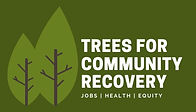

ACTION
TREES FOR COMMUNITY RECOVERY BELIEVES
The vital role urban and community trees play cannot be overstated. Trees are the most effective means of combating urban heat islands, preventing an estimated 1,200 heat-related deaths and countless heat-related illnesses each year. Trees in metropolitan areas and small towns across the country absorb 822,000 metric tons of air pollutants and prevent 575,000 cases of acute respiratory illnesses, such as asthma, annually. Our urban and community forests provide more than 15% of our country’s total forest carbon sequestration benefits. At the same time, by providing shade in summer months and blocking wind during winter, trees reduce residential energy usage costs by nearly $7.8 billion annually. City and community trees are also a major source of green jobs, with enormous potential for further local job creation in communities where it is needed most.
TREES ARE CRITICAL INFRASTRUCTURE: Urban forests are critical infrastructure, both currently and with increasing importance, as cities must now prepare for significant increases in weather and temperature extremes. Urban and community forests should be a priority for allocating infrastructure investment.
URBAN AND COMMUNITY FORESTRY CREATES MORE JOBS THAN ANY OTHER INFRASTRUCTURE INVESTMENT: Studies from the last recession show that natural resource work produces 2-3X the number of jobs/investment as other infrastructure investments. We could create tens of thousands of jobs quickly doing work that is critical to the present and future livability of our communities.
WE MUST PRIORITIZE UNDERSERVED AND AT-RISK COMMUNITIES: Communities of color and other underserved communities typically have both far fewer trees and less frequently protected and maintained shade trees. We need to prioritize both planting and protection actions in these areas first.
FUND APPLIED, COMMUNITY ENGAGED SCIENCE: We need applied research on how to most effectively implement forestry actions, working with affected communities, to ensure we achieve the community recovery and resilience objectives projects are intended to accomplish.
OUR CORE POLICY PRIORITIES
IMPORTANT OPPORTUNITIES TO ACT




ENGAGE YOUR CONGRESSIONAL DELEGATION: Reach out to your members of Congress and Senators and ask them to request that funding for urban and community forestry be included in the infrastructure package and to have those members of Congress and Senators reach out to Congressional Leadership, House and Senate Agriculture committee leadership and members, House Natural Resources and Senate Energy and Natural Resources members, and House and Senate Interior Appropriations members to share these objective and talking points.
REQUEST BUDGET INCREASES FOR THE US FOREST SERVICE URBAN AND COMMUNITY FORESTRY PROGRAM: Request significant increases in the U.S. Forest Service Urban and Community Forestry cost share grants to move the program beyond technical assistance and direct investment in communities.
HIGHLIGHT CURRENT LEGISLATIVE PROPOSALS: Indicate support for the provisions in the “Reforest America Grant Program” the “Climate Stewardship Act” (Sen. Cory Booker), the TREES Act (Rep. Doris Matsui) and other calls for increasing funding to urban and community forestry.
IDENTIFY OPPORTUNITIES THROUGH OTHER FEDERAL AGENCIES: Ask congressional members to look across all agencies such as DOI, DOT, HUD, DOE and others, to prioritize funding for tree planting and care.
SIGN ON TO THE CAMPAIGN
Trees for Community Recovery is creating a movement to create jobs, improve community health and reduce inequities―an incredibly timely opportunity to transform the way we think about and implement new solutions to solve climate change and inequity.
If you and your organization are interested in joining us, sign on to our campaign and get in touch! Fill out this form to be listed among the campaign supporters below and let us know how you are taking action to promote urban forestry in your community.
Government
Steve Adler, Mayor, City of Austin, TX
Christopher Taylor, Mayor, City of Ann Arbor, MI
Esther Manheimer, Mayor, City of Asheville, NC
Leslie Hager-Smith, Mayor, Town of Blacksburg, VA
Lauren McLean, Mayor, City of Boise, ID
Sam Weaver, Mayor, City of Boulder, CO
Miro Weinberger, Mayor, City of Burlington, VT
Michael Hancock, Mayor, City and County of Denver, CO
Paul Deasy, Mayor, City of Flagstaff, AZ
Lily Mei, Mayor, City of Fremont, CA
Wade Troxell, Mayor, City of Ft. Collins, CO
Bruce Teague, Mayor, Iowa City, IA
Quinton Lucas , Mayor, City of Kansas City, MO
Adam Paul, Mayor, City of Lakewood, CO
Leirion Gaylor Baird, Mayor, City of Lincoln, NE
Nicholas Angelo, Mayor, Town of Lyons, CO
Jacob Frey, Mayor, City of Minneapolis, MN
William Peduto, Mayor, City of Pittsburgh, PA
Jorge O. Elorza, Mayor, City of Providence, RI
Erin Mendenhall, Mayor, Salt Lake City, UT
London N. Breed, Mayor, City and County of San Francisco, CA
Sam Liccardo, Mayor, City of San Jose, CA
Alan Webber, Mayor, City of Santa Fe, NM
Kate Stewart, Mayor, City of Takoma Park, MD
Jan Kulhman, Mayor, City of Thornton, CO
Wade Kapszukiewicz, Mayor, City of Toledo, OH
Lindsey Horvath, Mayor, City of West Hollywood, CA
Ras J. Baraka, Mayor, City of Newark, NJ
Marion Greene, Chair, Hennepin County Board, MN
Anna Hansen, County Commissioner, Sante Fe County, NM
Marc Elrich, County Executive, Montgomery County, MD
Buddy Dyer, Mayor, City of Orlando, FL
Rosalyn Bliss, Mayor, City of Grand Rapids, MI
Ted Wheeler, Mayor, City of Portland, OR
Advocacy & Community Organizations
Center for Regenerative Solutions
American Forests
The Trust for Public Land
Urban Sustainability Directors Network
Friends of San Leandro Creek
Asheville GreenWorks
100K Trees for Humanity
Speak for the Trees, Boston
Companies
The Davey Tree Expert Company
The Keystone Concept